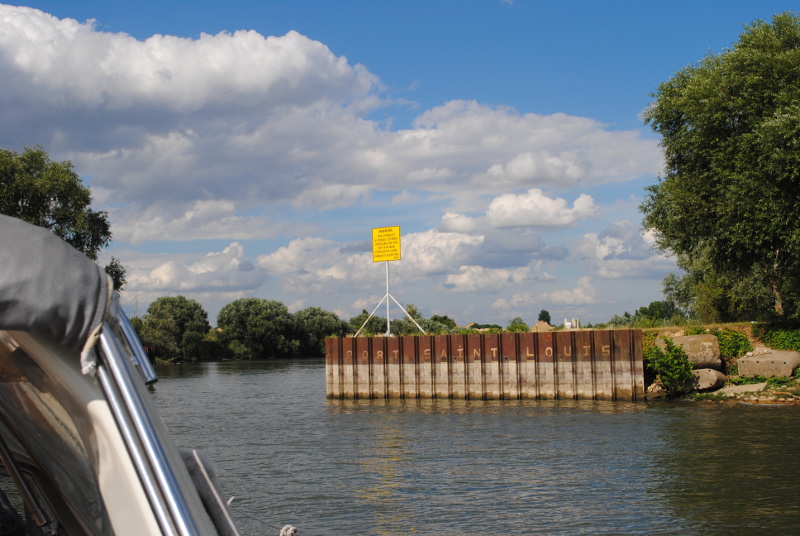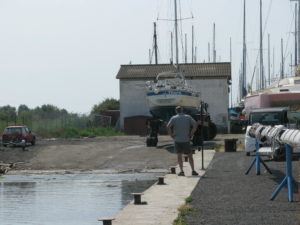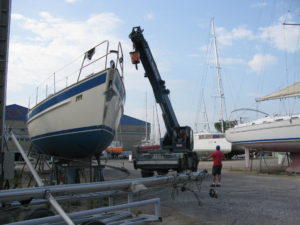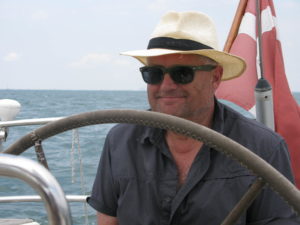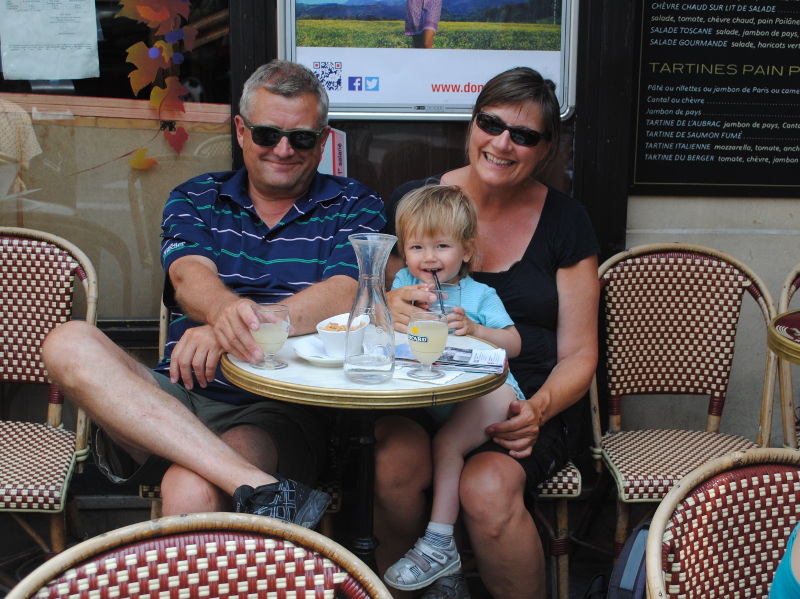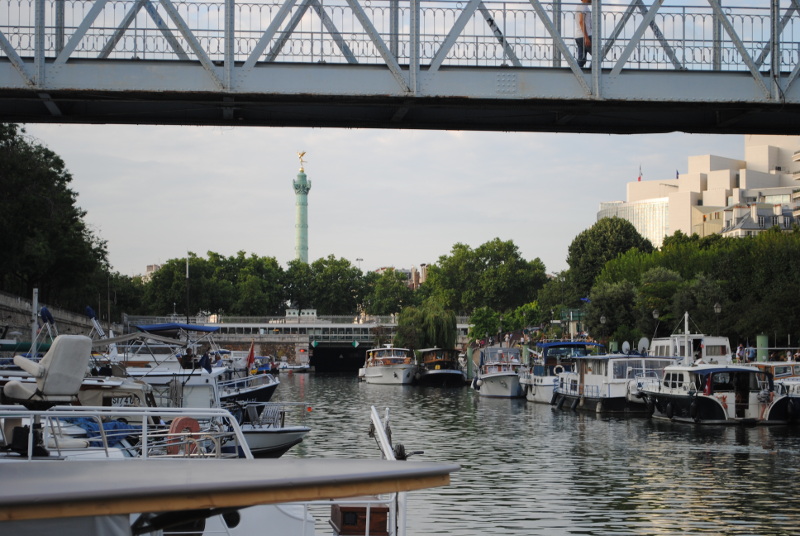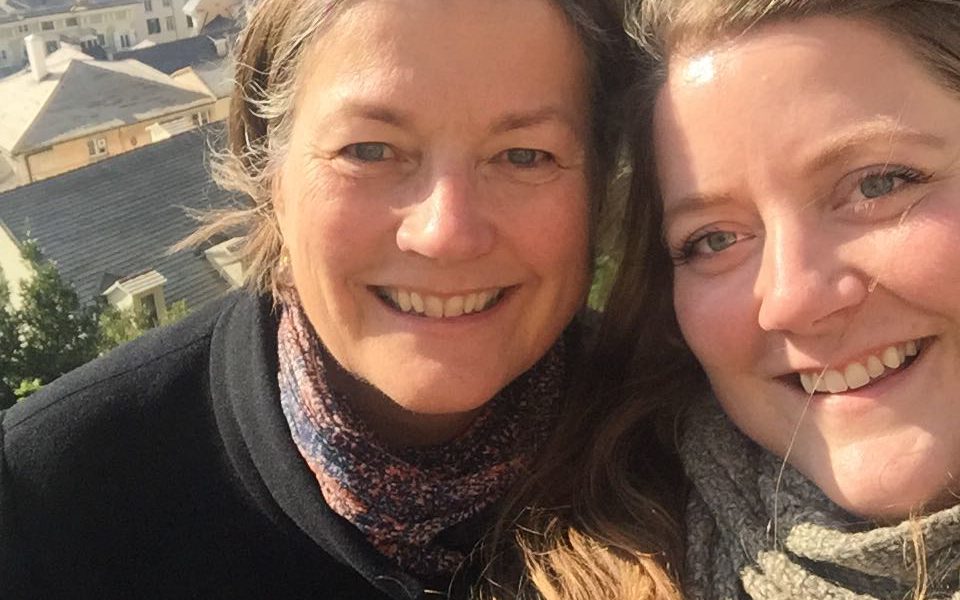
Genoa does not win at first sight
44° 24′ 39.06” N 8° 55′ 24.5352” E
Course Genoa. Full sail. Great sailing. The harbour of Genoa is huge. You turn into the harbour and you keep sailing and sailing and sailing, the harbour just goes on and on. Ferry berths, container ports, yachts. This port is mega.
We are received like the lost but now returning son. “Ahh, Ronja,” they say, as we call the harbour office in advance and tell them, that we are arriving. “Ahh, Mister Westergaard,” they say, as we enter the harbour office. We have already a couple of months ago agreed with the harbour office in Genoa, that Ronja shall spend the winter from October 1st to late March, so we have been writing together and agreed on price and conditions through numerous emails prior.
Genoa is not a beautiful city. It’s a rough town, with its poverty, and its most worn buildings facing the harbour. There are no showy facades with upscale restaurants. Here are halal butchers, souvenir shops, beer bars, dubious electronics stores plus a jumble of street vendors selling umbrellas, selfie-sticks and copies of Gucci-bags and Rolex watches.
The port population has a conspicuous large percentage of immigrants from Africa. The neighborhood is a complex network of alleys, narrow streets lined with five-storey buildings on each side, where the sun never reaches the street level. Worn. Dodgy. Prostitutes on street corners. The waste flows. Unsafe after dark.
This does not mean that the city has no beautiful buildings. In between we find the most stunning and beautifully renovated palaces and cathedrals.
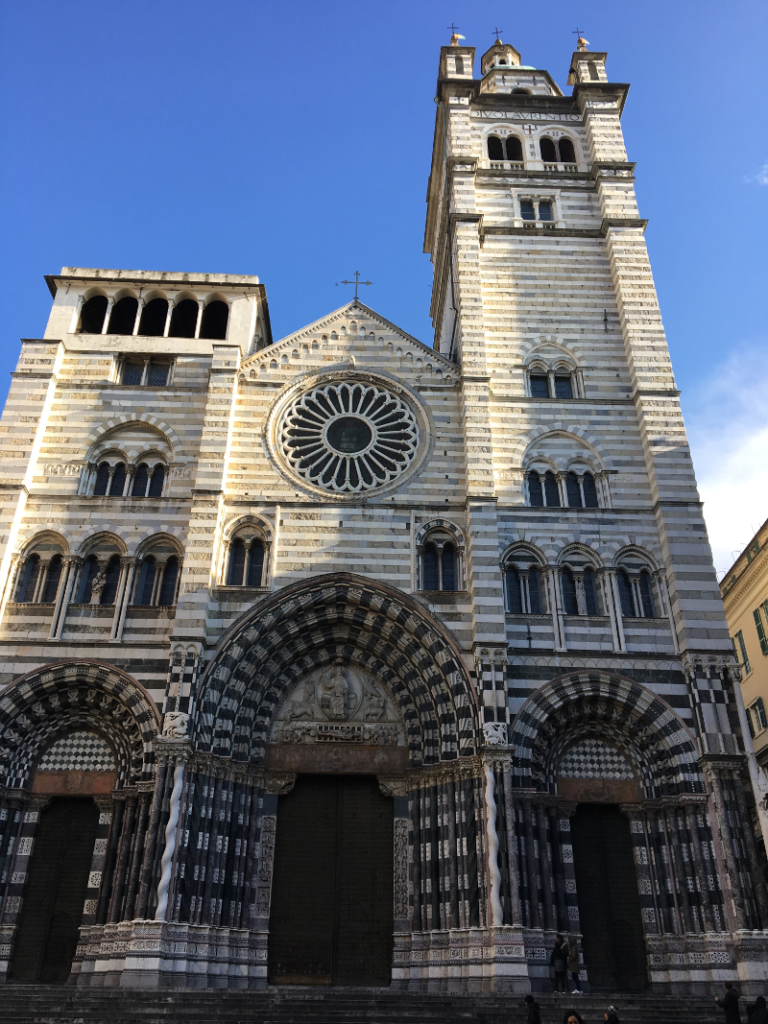
San Lorenzo Church in Genova is beautiful!
It is a city, you have to work with. Only when you reach deep into the city, you find its beauty, charm and nuances.
Ronja has had winter harbour in Marina Porto Alto for nearly six months and each time we visit Genoa, our respect for the city is increasing.
When one day we inadvertently wander into a suspect tunnel for cars, we happen upon a rickety elevator, take it up and suddenly find ourselves in a wonderful space with roof gardens and magnificent views of the port area of Genoa.
When we look for genuine Italian cuisine, we find lots of good options. Taverna Di Colombo is small, good and cheap. The host plays jazz and Leonard Cohen and serves a heavenly minestrone soup.
In Genoa we also meet interesting and nice people from the British yacht “Red Rooster” – Derek and Claire – who have chosen to go “all in” on sailing in the Mediterranean. They have sold their home in London, said goodbye to good jobs and have now spent two years full time aboard”Red Rooster”. https://www.sailingredrooster.com/form__map
We met them earlier along the italian coast, and it was great to see them in Genoa. The first evening they invited us to “Red Rooster” with beer, chips and exchange of experiences among sailors. The next evening they came to Ronja and we continued the exchange of experiences on sailing and in particular the considerations of whether a new boat would fulfill the dream of “the perfect boat” or in fact small changes on your own boat could be as good as an expensive, new boat.
Interestingly Claire had been a headmaster in her civilian life in England, just like Kirsten had in Denmark. Both have very recently left school management positions. Kirsten in her early 60s. Claire in her final 30s.
Now it’s April. A new season is upon us. We clean the boat, we get a diver to scantily clean the screw, cooling water intake and bow thruster. “Mamma mia,” he says, after he has been below Ronja with brush and scraper. Six months in winter port leaves its traces.
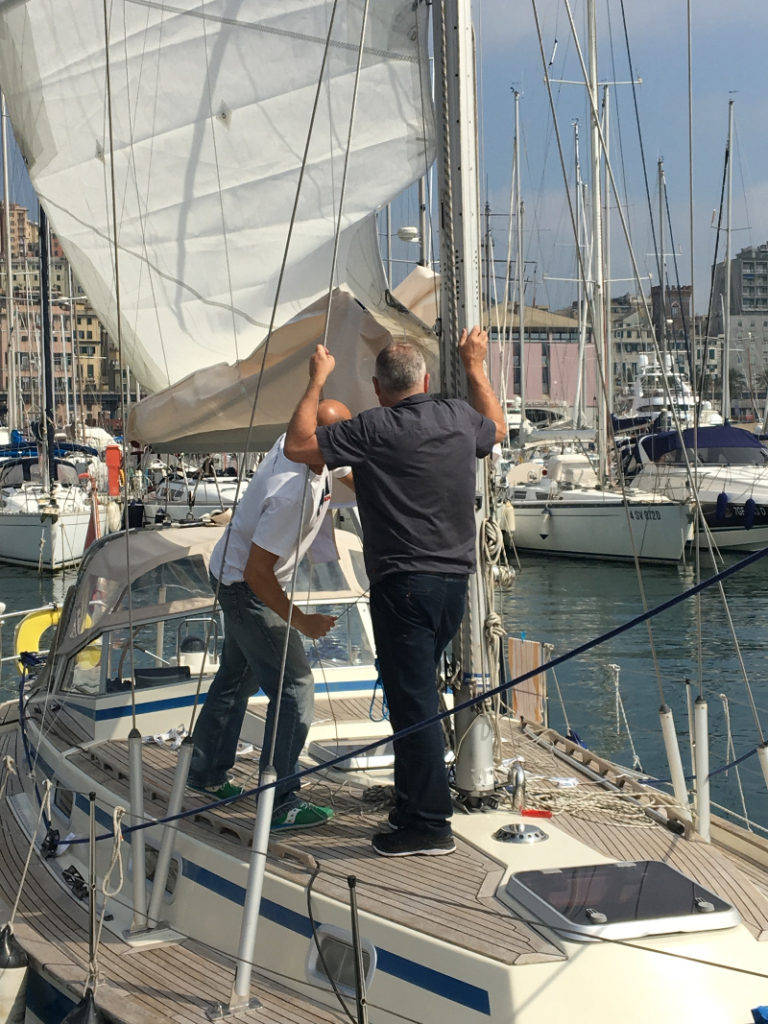
New foresail and main sail. Yeahh!
We raise our brand new sails from North Sails and set out for new adventures.
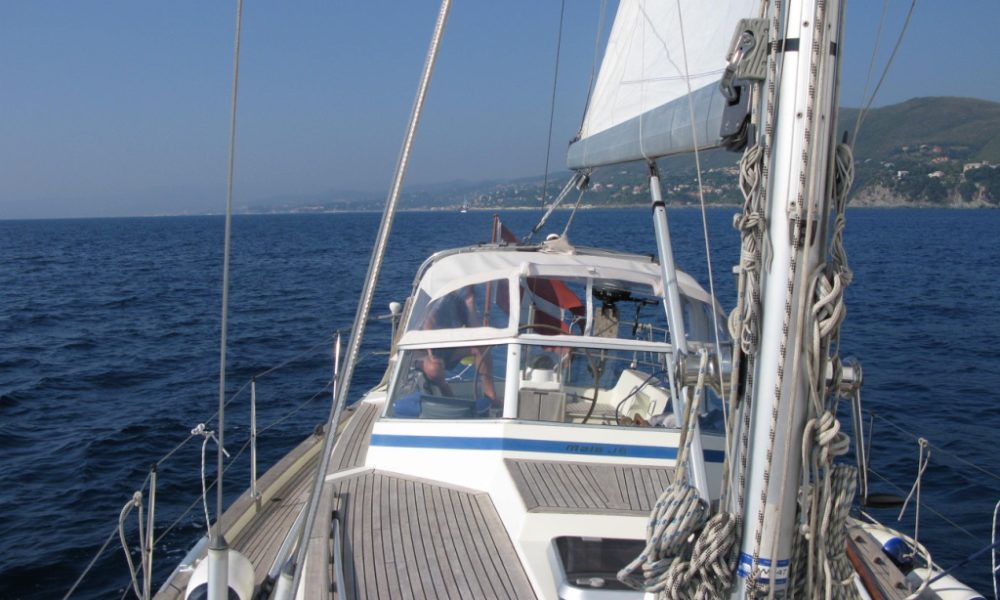
Never take no for an answer – when it comes to a berth
43° 35′ 2.1804” N 7° 7′ 41.7288” E
26.juli 2016

Antibes is a lovely town. Manageable – with beaches, nice museums, restaurants and an unmistakable maritime character
Antibes: The woman behind the counter shakes her head: “You must understand, that what you are asking can not be considered. We do not hire out berths on monthly contracts in July and August. We only hire out one day at a time, eventually two days and then you can come and ask, if you can hire one more day. Those are the rules. ”
The woman behind the counter has an expression that lets us understand, that our request takes the prize as the month most foolish.
“It’s not the port’s berths. It is the individual owners. We can not know, when the owner comes back and want to use the berth himself. ”
The woman is sitting behind the counter at the port office in Port Vauban, Antibes’ giant port, who reportedly is Europe’s largest marina with over 1700 berths, including a billionaire pier for those boat-owners, who can not settle for two or six employees but has 40 or – in one case – even 60 crew members.
We had asked the woman, if we could rent a berth for our sailing boat Ronja for a month or more, while we were back home in Denmark. Obviously we could not. There are rules. And where we were we all, if rules are not followed?
We leave the harbour office crestfallen. We think, again we have met that French arrogance, where at least some officials have a greater need to show who is the boss, than they have an interest in finding a possible solution with the customer.
Nevertheless: We MUST be in Denmark on August 2. or 3., and we CAN at the earliest be back in the south of France on September 12 . The problem has to be solved.
We take place in Café Felix, who has an acceptable wifi and a decent white wine, and we send a flurry of e-mails to ports and shipyards along the Riviera – from Cannes in the west to Menton in the east.
We would like to have Ronja to lie in the water from August 2 to September 12. But we are desperate enough to make a comprehensive agreement for the entire winter, including getting the boat taken out of the water, if the other ports also rejects having her in the water for more than a month.
We get the fastest responses from those, that we seek out personally. Three yards/boat repair shops in Antibes each have a crane large enough to lift Ronja out of the water. All three are sincerely accommodating to our problem. One says, however, straight out that he can make more money utilising his port area to prepare and repair boats than to have our Ronja standing in hibernation. Fair enough.
Another oat repair shop offers to take Ronja on land and store her in a corner of their port area until April, eight months for the price of 7.500 €. A shipyard offering to hive Ronja on land, take the mast of her and carry her into the country, where they have a storage space. Price: 8.200 €.
Thanks. But no thanks. On these terms we will not take Ronja out of the water.
So begins the answers ticking in via the mail. The most professional ports, the four ports that are part of the organisation Riviera Ports – Cannes, Nice, Golfe-Juan and Villefranche – acknowledge immediately with a standard mail, that they have received my mail, and that they will answer the question within 48 hours.
Three of them actually do this. Nice offers to cover part of the period. Cannes and Villefrance says no but they will put us on the waiting list. We do not hear from Golfe-Juan. The same applies to six or seven other marinas. No responce at all. Not a single line.
And yet. One port answers. The most surprising of them all.
We basically had received oral refusals from Port Vauban, but when we sat down and wrote mails, we also sent Port Vauban an email.
And, big surprice! Port Vauban answers yes, they have a place to Ronja from August 2 till September 12.
Hooray for Port Vauban! The port of Antibes is back in the lead. We acknowledge with a yes to the conditions and promise to be there on August 2.
And what did we just learn here? We learned that one hand in a port office do not necessarily know what the other hand is doing. A refusal from one employee can become a happy acceptance from another. Never take no for an answer – when it comes berths.
Reflection: In the four years we’ve been sailing out into the world with Ronja, many have asked whether it is not hard to set aside our boat when we are at home in Denmark and work many months. On the contrary. It has been easy. Easy in Holland. Easy in northern France. Easy west of Marseilles. The French Riviera proved to be a little more difficult and more expensive. But anyway: Again a solution could be created in a short time.
You pay for it. In our case, we pay € 1,082 for 40 days in high season. But as I said: We just had to go back to Denmark on August 2.
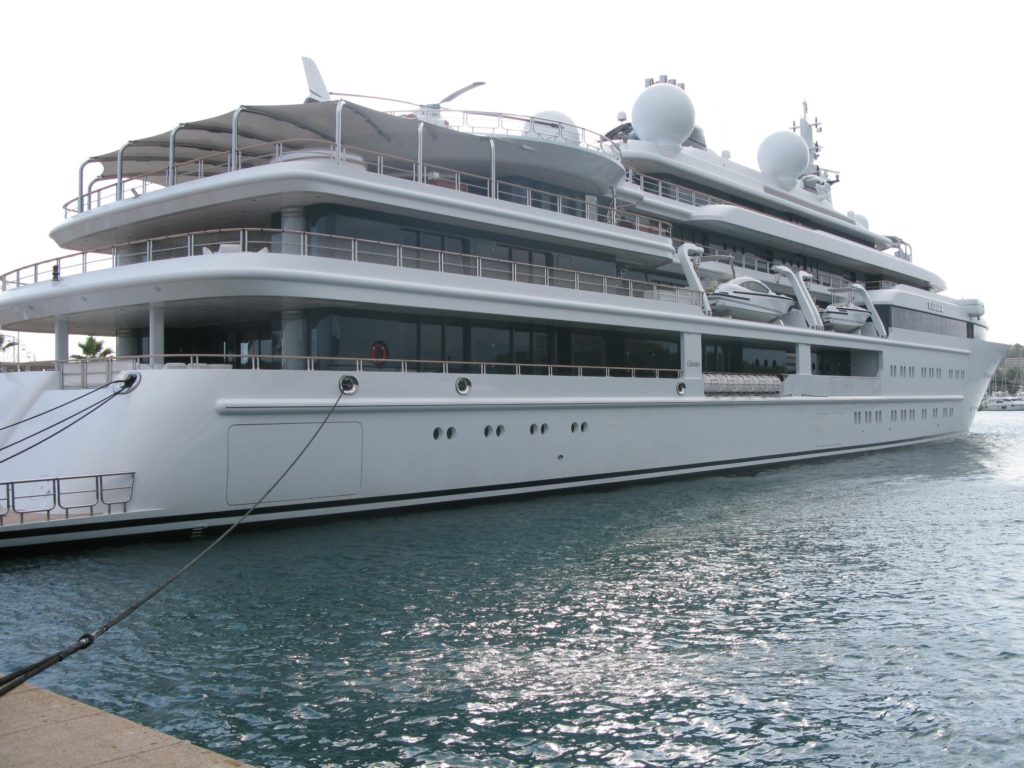
Our “neighbours” in the Antibes, Yacht “Katara”, is 124 meters long, has a crew of 60 and is owned by the emir of Qatar. Price: 300 million $
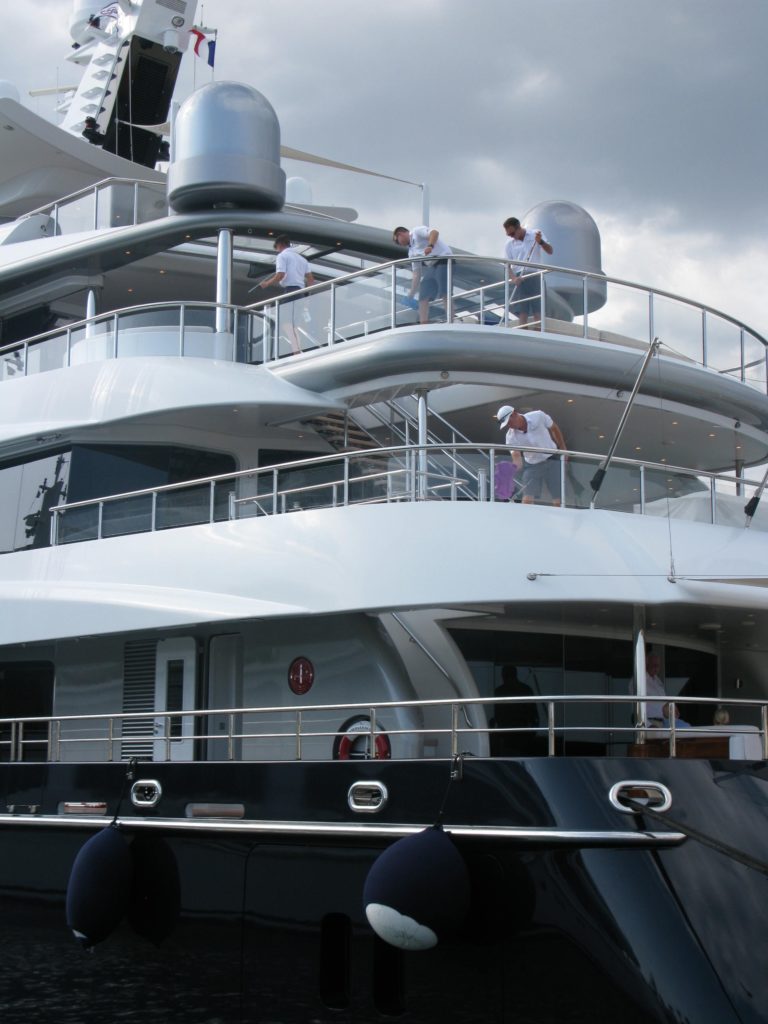
There rinsed, scrubbed, rubbed and polished. Employees at billionaire yachts clean constant when the yacht is in port
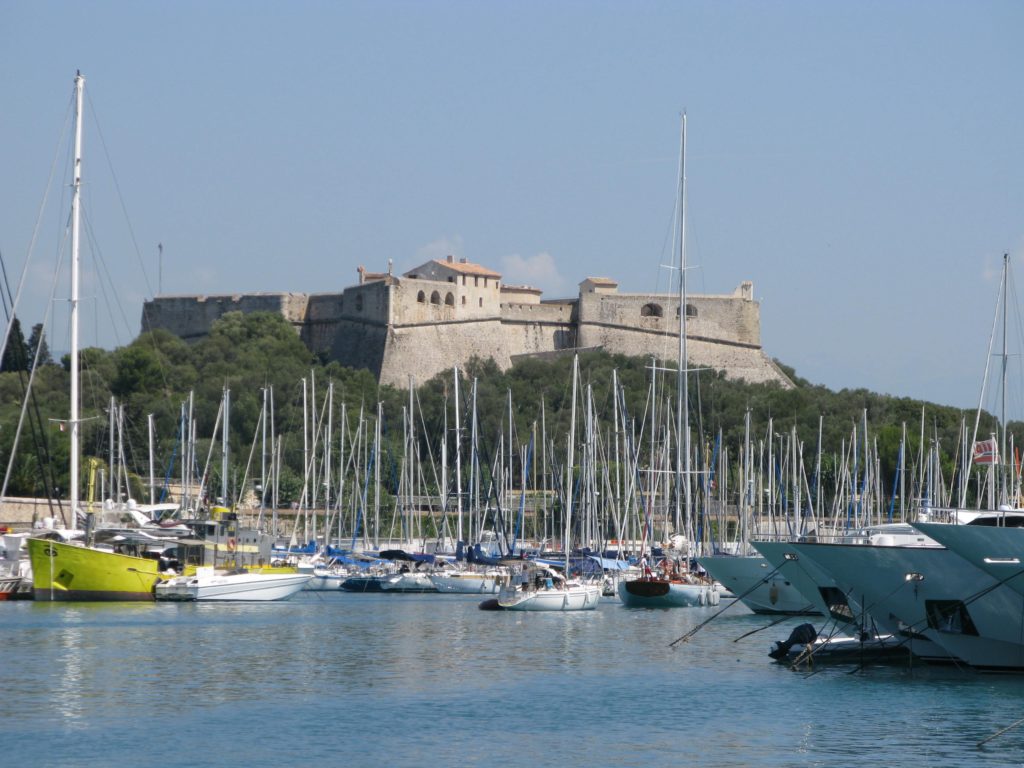
Antibes is said to be the capital of the yacht industry. Here you can buy a billion-boat, get signed up as a sailor, have new uniforms for your crew 🙂
Again in France, now Mediterranean
43° 23′ 15″ N, 4° 48′ 15.84″ E
June 29, 2016
Our driver is agitated. Why do those women not move their car so he can get past?
Fools! He opens the car window, shouting to the two women, that they should turn into a parking lot, so he can get past.
He did not quite understand the situation.
The two women backed out of their parking space exactly at the same time as our driver and they prepare to drive one way while he prepares to drive the other way. Now it is bumper to bumper. One woman gets out of the car and explains that this road is one-way, and that he is heading in the wrong direction. Therefore he must leave room for them to continue.
He snorts. Women. “Oh, la, la“. With his hand, he shows that these very women are impossible to explain to. “Je suis importante,” he said in a last attempt to win the match. “I am important.” It makes no impression. Our driver drives cursing back into position, leaving the women to pass and drives out again, while he mumbles about amateurs, women, people with no respect for authority and rules of the road.
Kirsten and I are sitting in the passenger seats and we see how the large arrow in the roadway show that it were the two women who were right. Our driver is a fool.
And we are back in France. Ready to resume our “circumnavigation in stages” on the good ship Ronja. A Swedish-built Malö 36, beautiful and solid. The past 11 months she has been parked on land 50 km west of Marseille. At Navy Service in Port Saint Louis du Rhone.
Our fool of a driver has just fetched us in the arrivals hall at Marseille airport with a sign from Navy Service: “Mr. Jensen “. It’s us. He is certainly 80+, looks like an angry Santa Claus with a white beard and rimless glasses, speaks only French and has probably exceeded the expiration date on his driver licence. When we came out from the arrival hall of the airport’s parking lot, he could not remember where he had put his car. Wait right here, he said and circled aimlessly.
Sigh. Who are we going to entrust our life here? He finds the car, we throw our two soft bags into the back – and then comes the two women and insist on their right. It’s not his day, this driver.
Navy Service is a great place. They have 1,200 boats in winter storage on land. They have specialized in lifting the ships on shore, park them and later – after several months – to put them in the water again. Others cannot. They operate cranes – boom cranes and ship cranes. And they are good.
In the living area – like some parasites – a dozen small independent craft businesses are operating. Some of these may prepare your engine for the winter, other repair epoxy damage, others can sew your storm- and cold- resistant nordic cockpit tent into a light and airy, Mediterranean-bimini. It is expensive. But damn it, it’s great.
I think it is a French specialty: Port du sec. Dry ports. Large paved or gravel areas where French and globetrotters leave their boats winter storage with masts on. It protects the boat against fouling, let them dry out and perfectly suited to those who still have only a sailing season of a few months.
Even with help from local craft people we sailors often forget, how much work it takes to make a sail boat ready to sail. The mast must be cleaned. Shroud and stays needs to be adjusted. Electrical installations between the mast and the boat must be restored. Bulbs should be changed. The drain should to be cleaned. Sails has to be put on. Defective parts replaced. Everything must have cleaning and polishing. Water and food should be stored.
It takes days. More time than anyone just walk around and remember. We get it all done, even if the sun above the Rhone delta is relentless. We prefer to work early morning and late evening, and at night we struggle with mosquitoes.
While we work we sometimes get a glimpse of our driver from the airport. He seems to function also as a worker in Navy Service. Today he drives a truck, moving containers and large bins with a tight-lipped expression.
No need to get in his way. None.
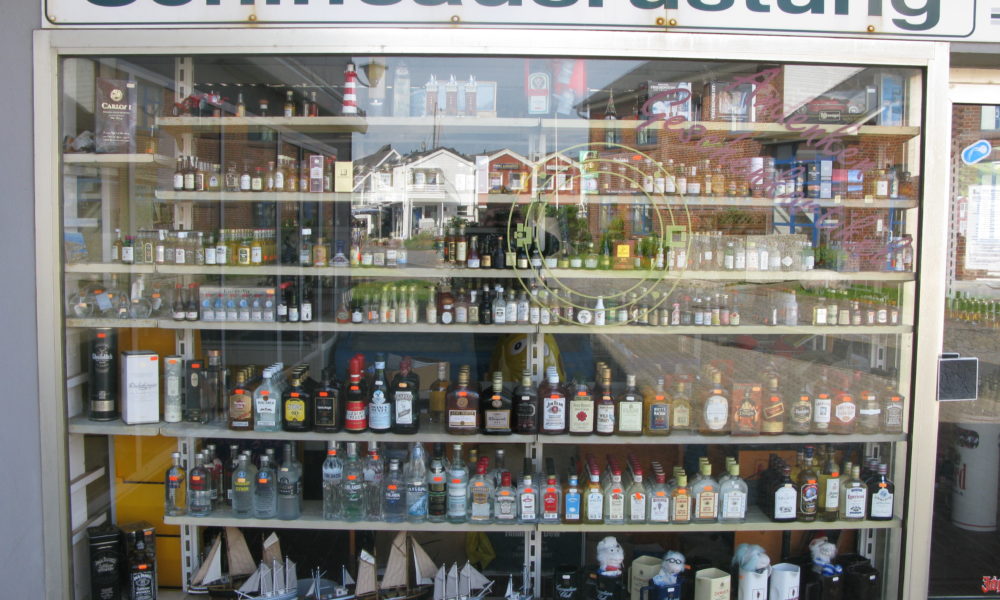
Status: Year two of Ronjas circumnavigation – 2013 – was a fine vintage.
48° 54′ 33.66” N 2° 11′ 30.9984” E
July 29. – 2013
We secure and clean Ronja and pack the car. Three hours later, we are in the heart of the Burgundy district, in the city of Beaune. A new kind of holiday begins. We rented two rooms at an IBIS hotel at almost six hundred crowns per room per night. And one additional room in the Alsatian town of Eguisheim for the nights of Wednesday and Thursday.
In Burgundy, we are together with Vivi and Peter, whom we know through Hanne and Jorgen. We visit wineries, participate in tastings, buying Burgundy wines, celebrating Hannes’s birthday and follow the habbit of the last several days to only seek out restaurants, that are mentioned in the Michelin Guide for France either as Bib gourmands or as having one or two forks. It pays off almost every time. Cheap but very good three-course menus. Typically, at a price between 30 and 37 euros for three courses. We live as earls and barons.
French food gets vindicated during this trip. After the downturn in the so-called modern French cuisine in the 1970s when French food was synonymous with super-small portions, a thin, raw carrot on a plate with a small piece of meat, we actually thought that French cuisine had died. But it most certainly lives, is doing well and is a pleasure not only for the French, who have never recognised that good food can be made elsewhere than just in France.
The good life we continue later in a cute little town of Eguisheim, where the wine is merely replaced with Alsatian wines.
Thursday evening just before nine we are at home in Odense with six boxes of wine and a lot of experiences. Emilie and Molly waiting with food for the weary travellers.
It has been a very varied holiday. Sailing at sea for many days. Waterway navigation for many days. City breaks in Rotterdam and Paris. Epicures in Burgundy and Alsace. The best weather in mans memory. Sunshine almost every day. Family-companionship being with Lasse, Tianling and Nellie and Jørgen and Hanne.
Year two of Ronjas circumnavigation of the globe – 2013 – was a fine vintage.
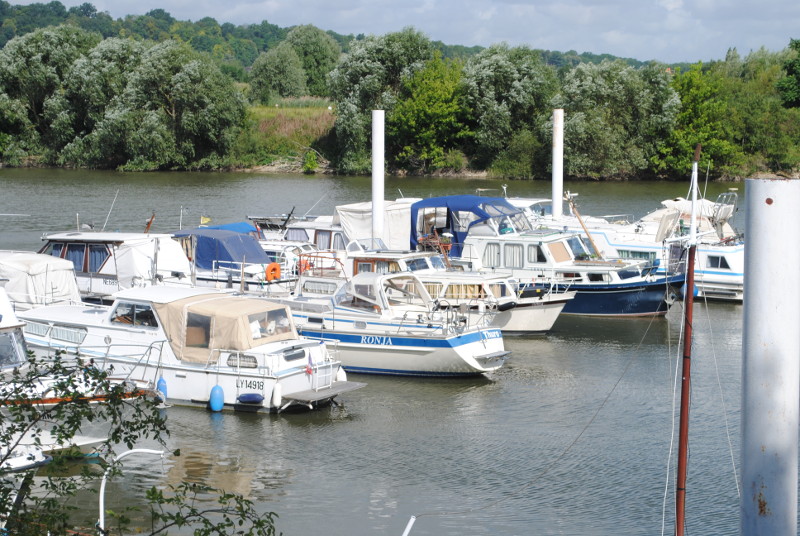
Here Ronja will stay over the winter 2013 to 2014
48° 51′ 3.9636” N 2° 22′ 4.6992” E
July 28. – 2013
In the late afternoon we call at Port St-Louis after a beautiful sailing through Paris and the northern suburbs.

Hanne and Per agree on a contract with the port captain. One years lease of berth in the harbour, supervised boat and help to winterize Ronja – a total of 1,890 Euros or 14,000 Danish kroner. This may sound expensive, but it’s still cheaper than having the boat lie on Thurø in Denmark.
The agreement is, that Per will write in English to the port captain’s son explaining what we want to have done about the boat when winter approaches – oil change, oil filter change, frost protection of water pipes, check the hot water heater and possibly charge the batteries.
The port captain is something of a pocket philosophical chatterbox, we get to hear about his Italian childhood and the difference between nordic values and southern European values. People in the north have lived hard lives. They have no time to talk. They get right to the point, says the harbour master. People in the South are more into each other, and establish a relationship before they reach the matter itself. He is obviously disappointed, that we do not want to talk about the advantages and disadvantages of different forms of contract length, while Per just makes it clear that he only wants a contract of one year.
Port St-Louis is a somewhat worn port, the boats in the harbour are also worn, and the toilet facilities are not something to write about.
We are located in an industrial area, with large ghetto settlements populated by immigrants. Poissy is the hometown of the Peugeot factories. Yet we believe that Ronja has found a good winter home. Kirsten is charming the port’s self-appointed lawman – the other port residents call him Rambo, his real name i Hans – who lives all year in his boat just two berths from ours. We give him the remaining stock of beer and soft drinks from the refrigerator and keep our fingers crossed, that he too will keep a close eye on Ronja.
Log-book: Sailed distance: 81 km or 40 miles. Time: departs at 9:30 am. Paying in Arsenal harbour. At five o’clock, we are – again – at Port St-Louis. Crew: George, Hanne, Kirsten and Per. Weather: Still growing hot. The cockpit tent is up most of the trip in order to provide a little shade.
